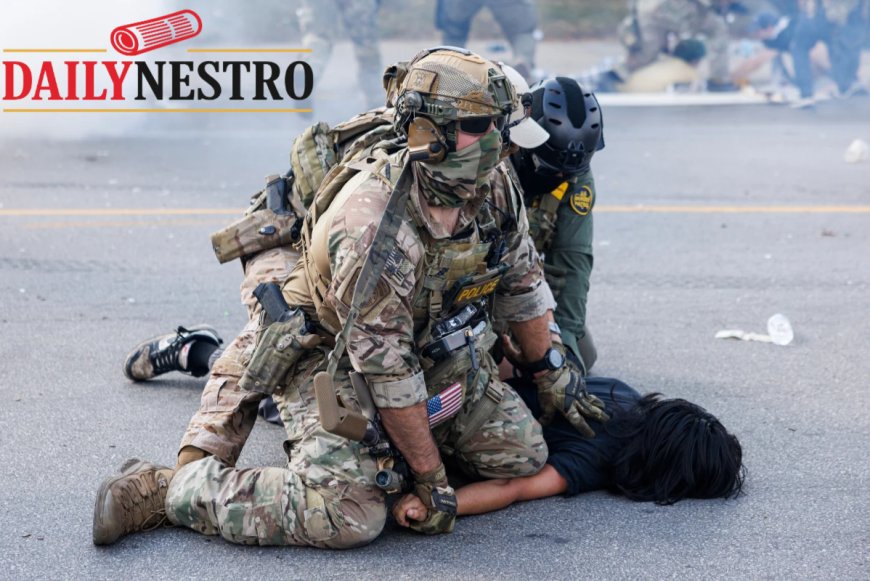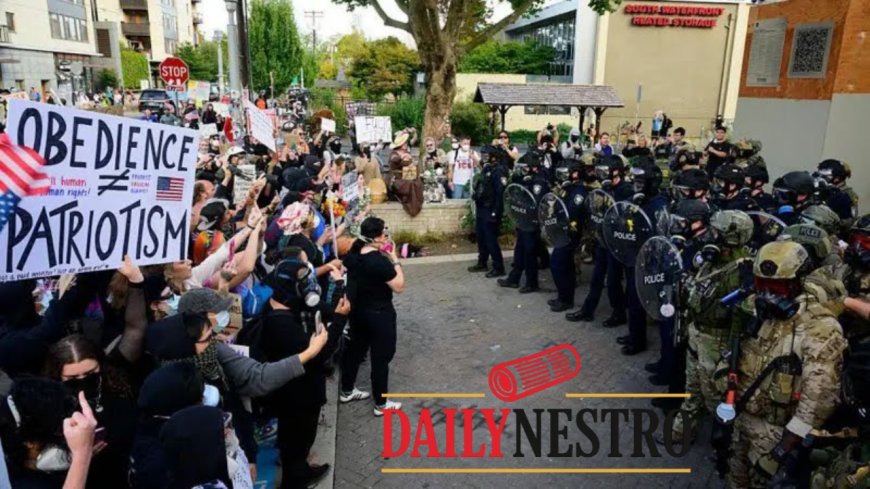Breaking news:Judge Stops Trump’s Oregon Troop Deployment, Citing Abuse of Presidential Power
A federal judge has temporarily blocked President Donald Trump’s plan to deploy National Guard troops to Portland, Oregon, marking a major setback for the administration’s domestic security strategy.

Federal Judge Halts Trump's Deployment of National Guard Troops to Oregon.
In a significant legal setback for the Trump administration, a federal judge has stepped in to prevent the deployment of National Guard troops from other states to Portland, Oregon. This ruling comes amid escalating tensions between the federal government and Democratic-led states over how to handle protests related to immigration enforcement. U.S. District Judge Karin Immergut issued a temporary restraining order late on October 5, 2025, blocking any federalized National Guard units from being sent to Oregon.
The decision highlights ongoing debates about presidential authority, states' rights, and the use of military forces in domestic situations.
Protests in Portland and Trump's Response
The controversy stems from protests outside a U.S. Immigration and Customs Enforcement (ICE) facility in Portland. These demonstrations have been simmering since President Donald Trump's second term began in January 2025,but they intensified in recent weeks. Protesters, numbering around 400 at times, have gathered to oppose what they see as aggressive federal immigration policies. Federal agents have responded with tear gas, pepper spray, and other crowd-control measures, leading to clashes that local officials describe as contained to a single city block. President Trump has framed these protests as part of broader "violent riots and lawlessness" in Democratic cities, justifying a crackdown to protect federal property and personnel. In late September, the administration federalized Oregon's own National Guard over Governor Tina Kotek's objections, aiming to deploy them in Portland. This move echoed a similar action in Los Angeles earlier in June, marking the first time in over 50 years a president overrode a governor's wishes to federalize troops.
However, a court ruling on October 4 blocked that specific deployment, prompting the administration to pivot.Undeterred, the Trump team quickly shifted gears. By early October 5, about 100 California National Guard troops already federalized for duties in Los Angeles landed in Portland, with another 100 following soon after. Defense Secretary Pete Hegseth also issued a memo authorizing up to 400 Texas National Guard members for potential deployment to Oregon, Illinois, and other areas. These actions were part of a wider strategy targeting cities like Chicago and Memphis, where similar federal task forces have led to hundreds of arrests and seizures of illegal firearms.
The Lawsuit and the Judge's RulingOregon and California swiftly filed a lawsuit challenging the out-of-state deployments, arguing they violated constitutional limits on presidential power. California Governor Gavin Newsom, a vocal critic of Trump, joined the suit, viewing the reassignment of his state's troops as an overreach. The case landed before Judge Immergut, ironically a Trump appointee from his first term.In an emergency hearing on Sunday night lasting less than 30 minutes Immergut expanded her earlier restraining order. She blocked the Trump administration from deploying any federalized National Guard members from across the U.S., including California and Texas, to Oregon. The judge accused the administration of trying to "circumvent" her prior ruling, questioning a Justice Department lawyer directly: "Aren’t the defendants simply circumventing my order?" She ruled that the protests did not constitute a "danger of rebellion" warranting such military intervention, suggesting Trump had exceeded his authority. The order is temporary, set to expire on October 19 unless extended. A hearing is scheduled for October 17 to decide on that extension, with arguments for a more permanent preliminary injunction slated for October 29.

Legal Arguments and Key Concerns
At the heart of the case is the balance between federal and state powers. The administration argued that protecting federal assets justifies federalizing and redeploying Guard units, even against governors' wishes. They pointed to successes in other operations, like a Memphis task force that made 273 arrests and seized 73 illegal guns in under a week. However, plaintiffs contended that these moves were an "end run" around court orders, with Oregon's attorney calling it "rhetorical whack-a-mole."Immergut sided with the states, emphasizing that local conditions in Portland hadn't worsened enough to justify military escalation. Portland Mayor Keith Wilson highlighted instances of "unjustified use of force" by federal agents, prompting notifications to the Department of Justice's civil rights division. Broader concerns include the potential for these deployments to incite further unrest, as Illinois Governor JB Pritzker labeled them "Trump’s Invasion," accusing the administration of creating chaos to rationalize more troops.
Reactions from Officials
The ruling drew sharp divides. Oregon Governor Kotek praised it as a stand against occupation of states with differing politics, vowing to resist Trump "at every turn."
California Attorney General Rob Bonta called it a "rebuke of the President’s illegal actions," noting it's outside presidential norms.
Newsom echoed this, stating on social media that "Trump’s abuse of power won’t stand" and framing it as using the military as a "political weapon." On the other side, White House Deputy Chief of Staff Stephen Miller blasted the decision as a "thunderous violation of constitutional order," insisting there's no distinction between border duties and protecting immigration facilities. Texas Governor Greg Abbott supported the deployments, boasting about his Guard's expertise.
Oregon Attorney General Dan Rayfield expects appeals from the federal government.
Broader Implications
This case could set precedents for future federal-state conflicts, especially in polarized political climates. It underscores tensions in Trump's second term, where immigration enforcement has become a flashpoint. Similar actions in Chicago where 300 Illinois Guard members were federalized and potential expansions to Memphis suggest the administration's strategy isn't slowing down. Critics worry about militarizing domestic policy, while supporters see it as necessary for law and order.
Finally,As hearings approach, all eyes are on whether the block holds or if appeals reverse it. For now, Portland's streets remain free of additional Guard troops, but the debate over authority rages.







